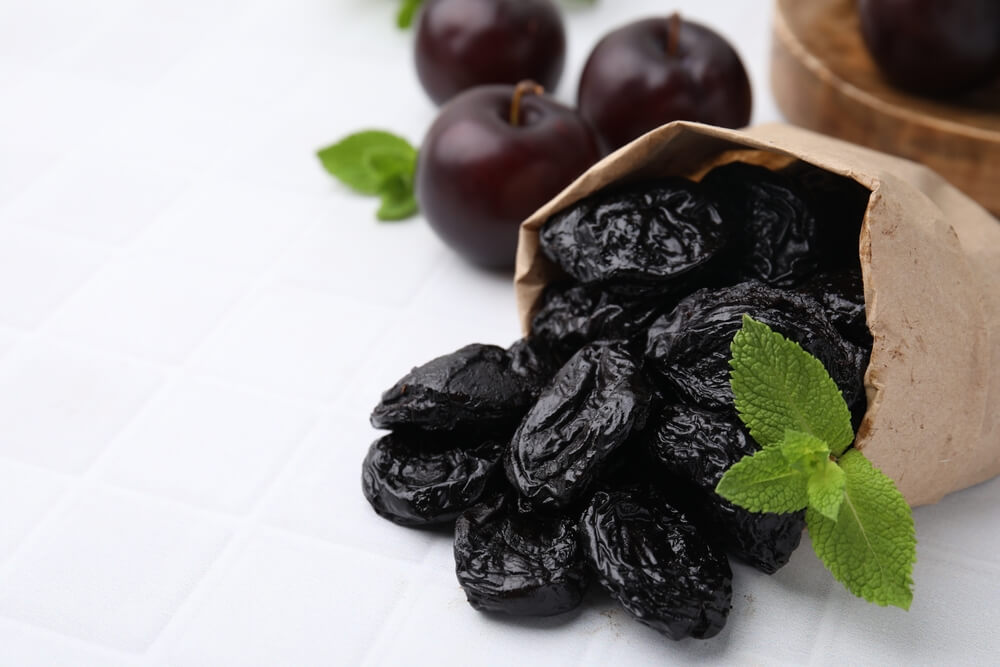As we age, our bodies go through many changes, and so do our dietary needs. It becomes even more important to make conscious choices about what we put into our bodies in order to maintain good health and vitality. While many seniors may turn to supplements or expensive superfoods, there is one simple and affordable fruit that often gets overlooked – prunes.
Yes, you read that right. Prunes, the wrinkly and unassuming fruit, have been gaining recognition for their numerous health benefits and should definitely be on the menu for seniors! Let’s take a closer look at why prunes deserve a spot in your daily diet.
- Promotes Digestive Health
As we age, our digestive system can become sluggish, leading to constipation and other uncomfortable digestive issues. This is where prunes come in, as they are a natural laxative and can help to relieve constipation. Prunes contain a high amount of insoluble fiber, which helps to keep things moving in our digestive tract. They also contain sorbitol, a natural sugar alcohol that has a mild laxative effect.
In addition to promoting regular bowel movements, prunes also have prebiotic properties, which means they help to nourish the good bacteria in our gut. This can improve overall digestive health and prevent uncomfortable bloating or cramping. So instead of reaching for over-the-counter laxatives, consider adding prunes to your diet as a natural and gentle way to promote digestive health.
- Boosts Bone Health
Osteoporosis, a condition where bones become weak and brittle, is a common concern for seniors. As we age, our bones lose density and become more susceptible to fractures. This is where prunes can be beneficial. Prunes are a rich source of vitamin K and boron – two key nutrients that are essential for maintaining strong bones.
Vitamin K is known for its role in blood clotting, but it also plays a crucial role in bone health. It helps to increase bone mineral density and improve calcium absorption, which can help to prevent osteoporosis. Boron, on the other hand, helps to increase the levels of estrogen and testosterone in the body, which are important hormones for maintaining bone health.
- Reduces Risk of Chronic Diseases
As we age, our risk of developing chronic diseases such as heart disease, diabetes, and cancer increases. This is where prunes can play a role in disease prevention. Prunes contain high levels of antioxidants, specifically polyphenols, which help to fight off free radicals in the body.
Free radicals are unstable molecules that can cause damage to cells and contribute to the development of chronic diseases. By including prunes in your diet, you can increase your intake of antioxidants, which can help to reduce the risk of these diseases and keep you healthier for longer.
- Provides Energy and Nutrients
As we age, our appetite may decrease, and we may find it more challenging to get the necessary nutrients from our food. Prunes are a great source of energy and nutrients, making them an excellent addition to a senior’s diet. They are rich in potassium, which helps to regulate blood pressure and maintain heart health. They also contain iron, which is important for energy production and preventing anemia.
In addition, prunes are a good source of vitamin B6, which helps to maintain a healthy nervous system and improve cognitive function. As we age, it’s essential to keep our minds sharp, and including prunes in our diet can help us do just that.
Tips for Incorporating Prunes into Your Diet
Now that you know the many benefits of prunes, you may be wondering how to incorporate them into your daily diet. Here are a few simple tips to help you get started:
– Snack on them: Prunes make for a delicious and nutritious snack. You can have them on their own or pair them with some nuts for a balanced and satisfying snack.
– Add them to your oatmeal: Chop up a few prunes and add them to your morning oatmeal for some extra fiber and natural sweetness.
– Use them in cooking: Prunes can add a unique flavor to savory dishes. You can try adding them to stews or braised meats for a touch of sweetness.
– Make prune juice: If you’re not a fan of eating prunes, you can try making prune juice at home. Simply soak some prunes in water overnight and blend them in the morning for a refreshing and nutritious drink.
Prunes are a nutrient-dense and affordable food that seniors should definitely consider adding to their diet. With their numerous health benefits, they can help to promote digestive health, boost bone health, reduce the risk of chronic diseases, and provide essential nutrients and energy. So next time you’re at the grocery store, don’t forget to pick up a pack of prunes and enjoy the sweet truth of this underrated fruit.




